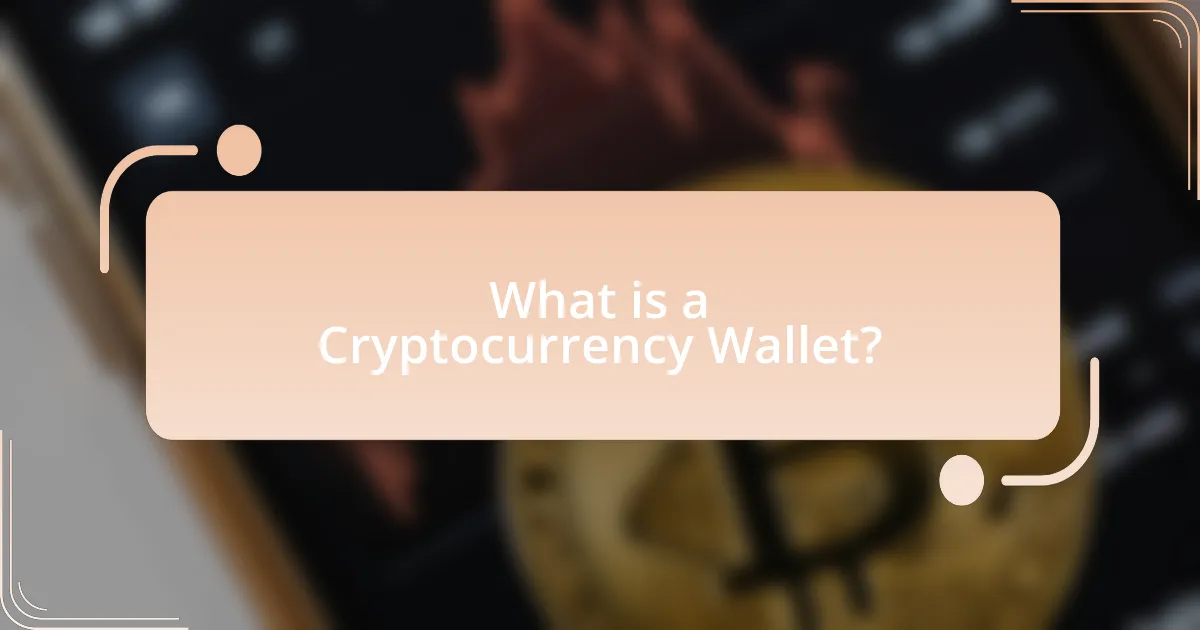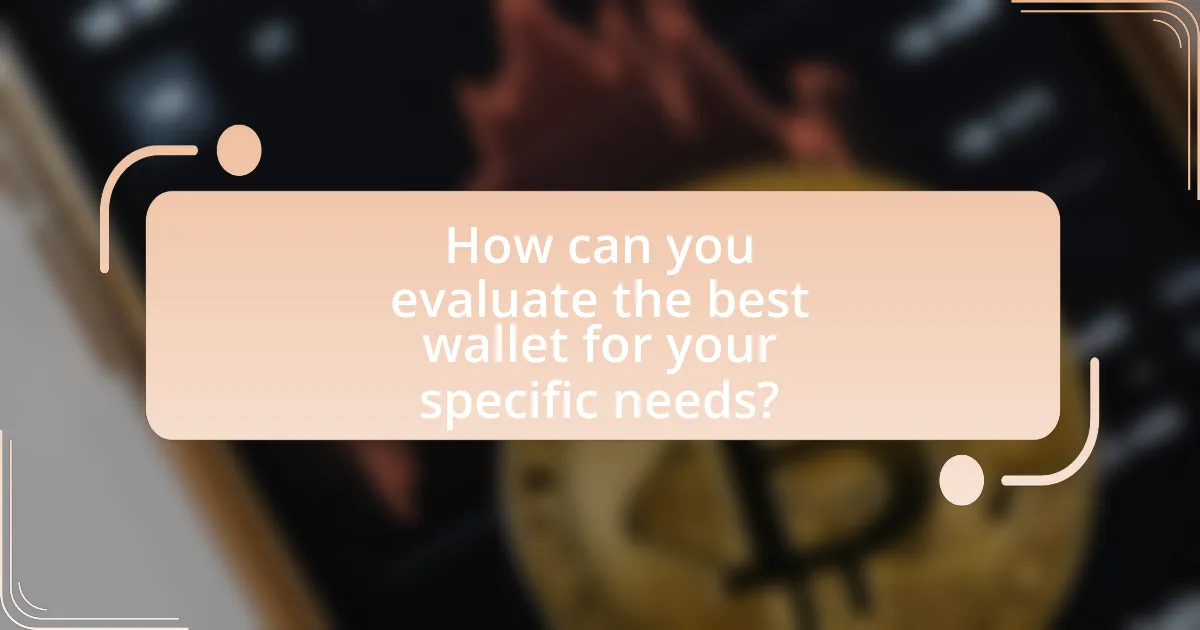A cryptocurrency wallet is a digital tool essential for storing, sending, and receiving cryptocurrencies, with various types including hot wallets, cold wallets, and hardware wallets. This article outlines the functions of cryptocurrency wallets, the importance of selecting the right one for security and accessibility, and the risks associated with using inadequate wallets. Key factors to consider when choosing a wallet include security features, usability, compatibility with different cryptocurrencies, and control over private keys. Additionally, the article provides recommendations for beginners and best practices for managing wallets to enhance investment strategies and safeguard digital assets.

What is a Cryptocurrency Wallet?
A cryptocurrency wallet is a digital tool that allows users to store, send, and receive cryptocurrencies. These wallets can be software-based, such as mobile or desktop applications, or hardware-based, which are physical devices designed to securely store private keys offline. The primary function of a cryptocurrency wallet is to manage the user’s public and private keys, enabling transactions on the blockchain. According to a report by Statista, as of 2021, there were over 68 million blockchain wallet users worldwide, highlighting the growing adoption and importance of these wallets in the cryptocurrency ecosystem.
How do Cryptocurrency Wallets function?
Cryptocurrency wallets function by securely storing private and public keys that allow users to send and receive digital currencies. These wallets interact with various blockchain networks to facilitate transactions, ensuring that users can access their funds and manage their cryptocurrency holdings. For example, a wallet generates a unique address derived from the public key, which can be shared with others to receive funds, while the private key, known only to the wallet owner, is used to authorize transactions. This dual-key system is essential for maintaining security and preventing unauthorized access to the user’s assets.
What types of wallets are available for cryptocurrency?
There are three main types of wallets available for cryptocurrency: hot wallets, cold wallets, and hardware wallets. Hot wallets are connected to the internet and allow for quick access and transactions, making them convenient for frequent trading. Cold wallets, on the other hand, are offline and provide enhanced security, making them suitable for long-term storage of assets. Hardware wallets are a specific type of cold wallet that store private keys on a physical device, offering a high level of security against online threats. Each type serves different user needs based on factors like accessibility and security.
How do different wallet types affect security and accessibility?
Different wallet types significantly impact security and accessibility in cryptocurrency management. Hardware wallets, known for their high security, store private keys offline, making them less vulnerable to hacking, while software wallets, which include mobile and desktop options, offer greater accessibility but are more susceptible to online threats. For instance, a study by the Blockchain Research Institute highlights that hardware wallets can reduce the risk of theft by over 90% compared to software wallets. Conversely, software wallets provide immediate access to funds and ease of use, which is crucial for frequent transactions. Thus, the choice between wallet types involves a trade-off between enhanced security and user-friendly accessibility.
Why is choosing the right wallet important for your cryptocurrency portfolio?
Choosing the right wallet is crucial for your cryptocurrency portfolio because it directly impacts the security, accessibility, and management of your digital assets. A secure wallet protects against hacks and theft, as evidenced by the fact that over $1.9 billion in cryptocurrency was stolen in 2021 alone due to inadequate security measures. Additionally, the right wallet facilitates easy transactions and portfolio management, allowing users to efficiently track their investments and make timely decisions. Therefore, selecting a wallet that aligns with your security needs and usage patterns is essential for safeguarding your investments and optimizing your trading experience.
What risks are associated with using the wrong wallet?
Using the wrong wallet poses significant risks, including loss of funds, exposure to hacking, and lack of access to assets. When a user selects an insecure or incompatible wallet, they may inadvertently expose their private keys to malicious actors, leading to theft. For instance, hardware wallets are generally more secure than software wallets, which can be vulnerable to malware. Additionally, using a wallet that does not support specific cryptocurrencies can result in permanent loss of those assets, as they may not be recoverable. According to a report by Chainalysis, over $3.2 billion in cryptocurrency was stolen in 2021, highlighting the importance of choosing a secure wallet.
How can the right wallet enhance your investment strategy?
The right wallet can enhance your investment strategy by providing secure storage, easy access, and efficient management of your cryptocurrency assets. A secure wallet protects against hacks and theft, which is crucial given that over $1.9 billion in cryptocurrency was stolen in 2020 alone, according to a report by CipherTrace. Additionally, a user-friendly wallet allows for quick transactions and tracking of investments, enabling timely decision-making. Efficient management features, such as portfolio tracking and analytics, can help investors make informed choices, ultimately leading to better returns.

What factors should you consider when choosing a cryptocurrency wallet?
When choosing a cryptocurrency wallet, consider security, usability, compatibility, and control over private keys. Security is paramount; wallets should offer features like two-factor authentication and encryption to protect assets. Usability refers to how easy the wallet is to navigate and use, which is crucial for both beginners and experienced users. Compatibility with various cryptocurrencies ensures that the wallet can support the specific digital assets you intend to hold. Lastly, having control over private keys is essential for maintaining ownership and security of your funds, as wallets that do not provide this control may expose users to risks of loss or theft.
How does security play a role in wallet selection?
Security is a critical factor in wallet selection because it directly impacts the safety of cryptocurrency assets. Wallets with robust security features, such as two-factor authentication, encryption, and cold storage options, significantly reduce the risk of unauthorized access and theft. For instance, hardware wallets, which store private keys offline, are considered among the safest options, as they are less vulnerable to hacking compared to software wallets that are connected to the internet. According to a report by CipherTrace, over $1.9 billion in cryptocurrency was stolen in 2020, highlighting the importance of selecting wallets with strong security measures to protect against such threats.
What security features should you look for in a wallet?
When selecting a wallet, you should look for security features such as two-factor authentication (2FA), encryption, and backup options. Two-factor authentication adds an extra layer of security by requiring a second form of verification, making unauthorized access more difficult. Encryption protects your private keys and sensitive information from being accessed by malicious actors. Backup options ensure that you can recover your wallet in case of loss or theft, which is crucial for safeguarding your assets. These features collectively enhance the overall security of your cryptocurrency wallet, reducing the risk of theft and loss.
How do private keys and seed phrases impact wallet security?
Private keys and seed phrases are critical components of wallet security, as they provide the sole means of accessing and managing cryptocurrency assets. A private key is a unique cryptographic code that allows the owner to authorize transactions, while a seed phrase is a human-readable representation of the private key, typically consisting of 12 to 24 words. If either the private key or seed phrase is compromised, an unauthorized party can gain full control over the wallet, leading to potential loss of funds. According to a report by Chainalysis, 3.8 billion dollars worth of cryptocurrency was stolen in 2021, often due to poor management of private keys and seed phrases. Thus, safeguarding these elements is essential for maintaining wallet security and protecting digital assets.
What are the usability aspects to consider in a cryptocurrency wallet?
The usability aspects to consider in a cryptocurrency wallet include user interface design, ease of navigation, security features, and customer support. A user-friendly interface allows individuals to manage their assets efficiently, while intuitive navigation ensures that users can quickly access essential functions such as sending and receiving funds. Security features, such as two-factor authentication and encryption, are critical for protecting assets from unauthorized access. Additionally, responsive customer support can assist users in resolving issues promptly, enhancing overall user experience. These aspects are vital for ensuring that users can effectively manage their cryptocurrency holdings while minimizing risks.
How does user interface design affect wallet usability?
User interface design significantly affects wallet usability by influencing how easily users can navigate and perform transactions within the wallet. A well-designed interface enhances user experience through intuitive layouts, clear labeling, and responsive feedback, which reduces the learning curve and minimizes errors during transactions. For instance, research indicates that 94% of first impressions relate to design, highlighting its critical role in user engagement and satisfaction. Furthermore, studies show that users are more likely to abandon wallets with complex interfaces, as 70% of users prefer simplicity and ease of use in digital applications. Thus, effective user interface design directly correlates with improved wallet usability and user retention.
What are the implications of wallet compatibility with different cryptocurrencies?
Wallet compatibility with different cryptocurrencies directly impacts user accessibility, security, and transaction efficiency. When a wallet supports multiple cryptocurrencies, it allows users to manage diverse assets in one place, enhancing convenience and reducing the need for multiple wallets. However, compatibility can also introduce security risks, as vulnerabilities in one cryptocurrency’s protocol may affect the entire wallet. Furthermore, transaction fees and processing times can vary significantly between cryptocurrencies, influencing the overall cost-effectiveness of using a multi-currency wallet. For instance, wallets that support Ethereum may face higher gas fees during network congestion, affecting user experience. Thus, the implications of wallet compatibility encompass user convenience, security considerations, and financial efficiency.

How can you evaluate the best wallet for your specific needs?
To evaluate the best wallet for your specific needs, first identify the type of cryptocurrency you plan to store, as different wallets support different currencies. Next, assess the wallet’s security features, such as two-factor authentication and private key control, which are crucial for protecting your assets. Additionally, consider the wallet’s user interface and ease of use, especially if you are a beginner. Research the wallet’s reputation by checking user reviews and expert opinions to ensure reliability. Finally, evaluate the wallet’s compatibility with exchanges and other services you intend to use, as this can impact your overall experience.
What are the top wallets recommended for beginners?
The top wallets recommended for beginners are Coinbase Wallet, Exodus, and Trust Wallet. Coinbase Wallet is user-friendly and integrates seamlessly with the Coinbase exchange, making it ideal for new users. Exodus offers a visually appealing interface and supports multiple cryptocurrencies, which is beneficial for beginners exploring different assets. Trust Wallet, the official wallet of Binance, provides a simple setup process and access to decentralized applications, making it a versatile choice for newcomers. These wallets are recognized for their ease of use, security features, and support for a variety of cryptocurrencies, making them suitable for individuals just starting in the cryptocurrency space.
What features make these wallets suitable for new users?
Wallets suitable for new users typically feature user-friendly interfaces, robust security measures, and educational resources. User-friendly interfaces simplify navigation and transaction processes, making it easier for beginners to manage their cryptocurrency. Robust security measures, such as two-factor authentication and encryption, protect users’ assets from potential threats. Additionally, educational resources, including tutorials and customer support, help new users understand how to use the wallet effectively and safely. These features collectively enhance the overall experience for individuals who are just starting in the cryptocurrency space.
How do beginner wallets compare to advanced options?
Beginner wallets typically offer basic features and user-friendly interfaces, while advanced options provide enhanced security, customization, and additional functionalities. Beginner wallets, such as mobile apps or web-based platforms, prioritize ease of use, making them suitable for newcomers who may lack technical knowledge. In contrast, advanced wallets, like hardware wallets or software wallets with multi-signature capabilities, cater to experienced users who require robust security measures and greater control over their assets. For instance, hardware wallets store private keys offline, significantly reducing the risk of hacking, which is a critical consideration for users managing larger amounts of cryptocurrency.
What are the best practices for managing your cryptocurrency wallet?
The best practices for managing your cryptocurrency wallet include using strong, unique passwords, enabling two-factor authentication, regularly updating wallet software, and keeping backups of your wallet. Strong passwords reduce the risk of unauthorized access, while two-factor authentication adds an extra layer of security. Regular software updates protect against vulnerabilities, and backups ensure that you can recover your funds in case of loss or theft. According to a report by Chainalysis, 70% of cryptocurrency thefts occur due to poor security practices, highlighting the importance of these measures.
How can you ensure the safety of your wallet information?
To ensure the safety of your wallet information, utilize strong passwords and enable two-factor authentication (2FA). Strong passwords should be complex, combining letters, numbers, and symbols, while 2FA adds an extra layer of security by requiring a second form of verification, such as a text message or authentication app. According to a study by the Cybersecurity & Infrastructure Security Agency, implementing 2FA can reduce the risk of unauthorized access by up to 99.9%. Additionally, regularly updating your wallet software and using hardware wallets can further protect your information from potential breaches.
What steps should you take to regularly update and maintain your wallet?
To regularly update and maintain your wallet, ensure you perform software updates, back up your wallet data, and monitor for security threats. Regular software updates are crucial as they often include security patches that protect against vulnerabilities; for instance, a 2021 report by the Cybersecurity and Infrastructure Security Agency highlighted that outdated software can lead to significant security breaches. Backing up your wallet data, ideally in multiple secure locations, protects against data loss due to hardware failure or theft. Additionally, actively monitoring for security threats, such as phishing attempts or malware, helps safeguard your assets; according to the Federal Trade Commission, consumers reported losing over $1.9 billion to fraud in 2020, emphasizing the importance of vigilance in wallet maintenance.
What common mistakes should you avoid when choosing a cryptocurrency wallet?
When choosing a cryptocurrency wallet, avoid the mistake of not researching the wallet’s security features. Many users overlook the importance of security, which can lead to loss of funds; for instance, wallets with weak encryption or no two-factor authentication are more susceptible to hacks. Additionally, failing to consider the wallet’s compatibility with various cryptocurrencies can limit your ability to manage your portfolio effectively, as some wallets only support specific coins. Another common mistake is neglecting to read user reviews and ratings, which can provide insights into the wallet’s reliability and user experience. Lastly, not understanding the difference between custodial and non-custodial wallets can result in a lack of control over your private keys, impacting your overall security and access to funds.
How can overlooking security features lead to losses?
Overlooking security features can lead to significant financial losses in cryptocurrency management. When users neglect essential security measures, such as two-factor authentication or encryption, they expose their wallets to hacking and unauthorized access. For instance, a study by Chainalysis revealed that over $3.8 billion in cryptocurrency was stolen in 2020 alone, often due to inadequate security practices. This highlights the critical importance of implementing robust security features to safeguard assets against theft and fraud.
What are the pitfalls of not researching wallet options thoroughly?
Not researching wallet options thoroughly can lead to significant security risks and financial losses. Users may choose wallets that lack robust security features, making them vulnerable to hacks and theft. For instance, a study by the Blockchain Security Company found that over $1.9 billion was lost to cryptocurrency theft in 2020 alone, often due to inadequate wallet security. Additionally, without proper research, users might select wallets with high fees or poor customer support, resulting in a frustrating experience and potential loss of access to their funds. Therefore, thorough research is essential to ensure the safety and efficiency of cryptocurrency management.
What tips can help you make an informed decision about your cryptocurrency wallet?
To make an informed decision about your cryptocurrency wallet, evaluate the wallet’s security features, user interface, and compatibility with various cryptocurrencies. Security is paramount; choose wallets that offer two-factor authentication, encryption, and a strong reputation for safeguarding assets. User interface matters for ease of use; wallets should be intuitive, especially for beginners. Compatibility is crucial; ensure the wallet supports the specific cryptocurrencies you intend to hold. According to a 2021 survey by Statista, 46% of cryptocurrency users prioritize security features when selecting a wallet, highlighting the importance of these factors in decision-making.